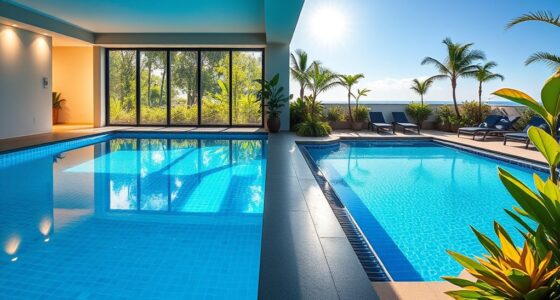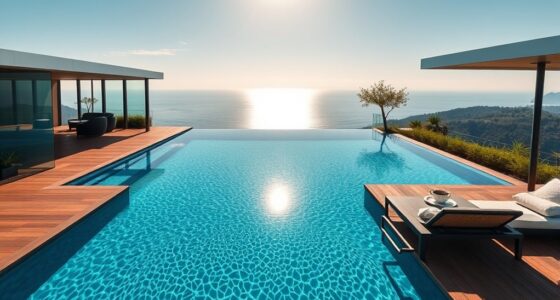To heat your endless pool, heat pumps are a great choice because they are energy-efficient, environmentally friendly, and operate quietly. Gas heaters are cheaper initially but cost more to run over time and produce emissions. Solar systems are eco-friendly and cost-effective long-term but depend on sunlight and require sufficient space. To find out which option suits your needs best and optimize your pool heating, you’ll want to explore the details further.
Key Takeaways
- Heat pumps are energy-efficient and ideal for maintaining consistent temperatures with lower operational costs.
- Gas heaters offer quick heating but have higher ongoing fuel expenses and environmental impacts.
- Solar heating is eco-friendly and cost-effective long-term but depends on sunlight availability and climate conditions.
- Consider initial investment, energy efficiency, and local resources when choosing the best heating method.
- For sustainability and lower environmental impact, solar and heat pump systems are generally preferable over gas heaters.
How Heat Pumps Work and Their Benefits for Endless Pools
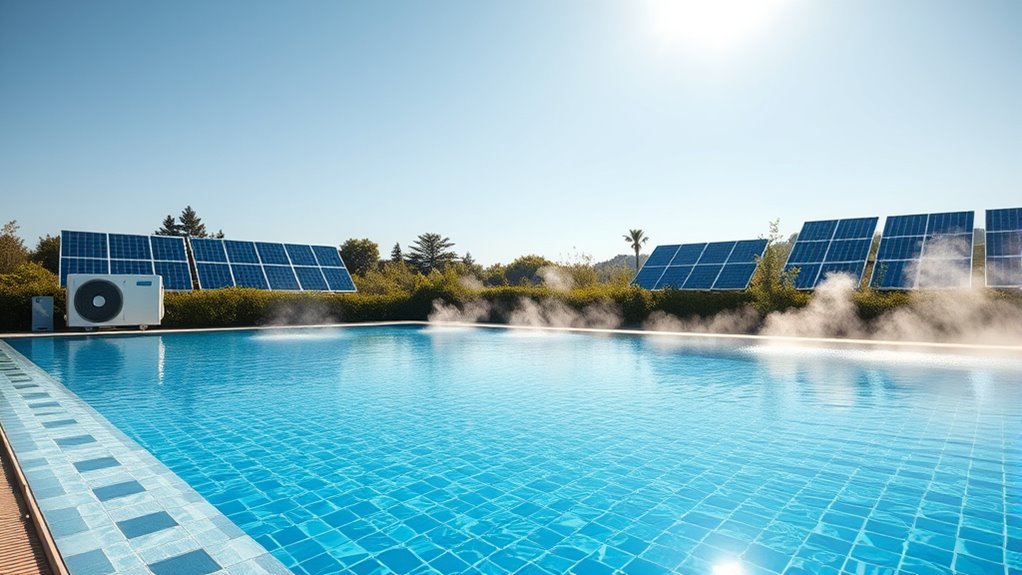
Heat pumps work by transferring heat from the outside air to warm your Endless Pool, making them an efficient heating option. They use a refrigeration cycle, similar to an air conditioner in reverse, to extract heat from the air—even in cooler temperatures—and move it into your pool. This process requires less energy than traditional electric or gas heaters, reducing your energy bills. Heat pumps can quickly heat your pool to your desired temperature and maintain it steadily. They’re environmentally friendly since they don’t produce emissions directly. Plus, they operate quietly, so you won’t be disturbed during use. Additionally, the low operating costs of heat pumps make them a popular choice for long-term pool heating. Overall, heat pumps offer a reliable, cost-effective, and eco-conscious way to keep your Endless Pool warm year-round.
Gas Heaters: Efficiency and Cost Considerations
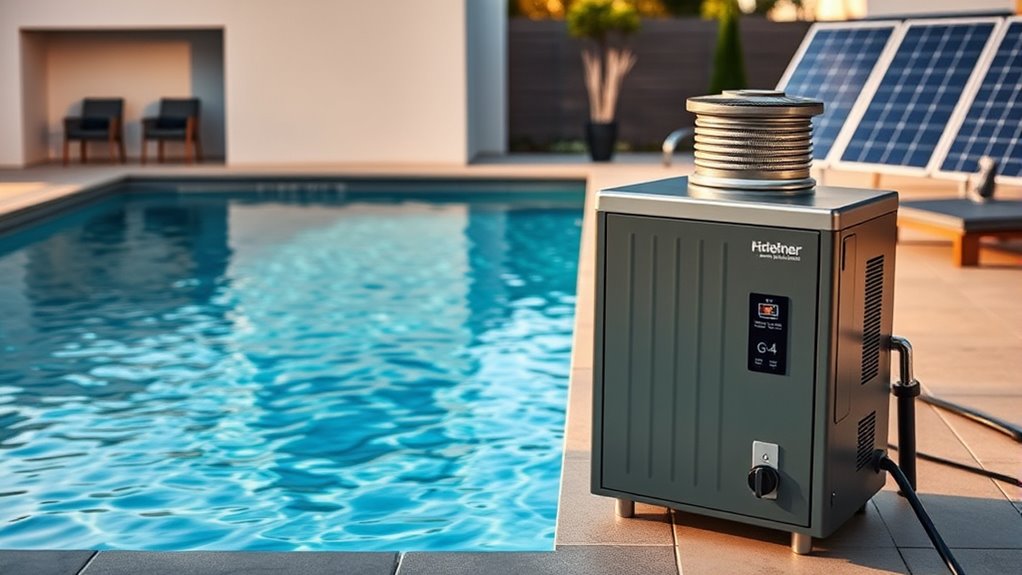
Gas heaters can be a cost-effective option upfront, but it’s important to contemplate their long-term efficiency and ongoing expenses. Installation and maintenance costs vary, affecting your overall budget over time. Additionally, their environmental impact may influence your decision depending on your sustainability goals. Moreover, understanding the regulatory compliance challenges associated with gas heaters can help prevent future legal or operational issues.
Cost Efficiency Analysis
While gas heaters can be a cost-effective option upfront, their overall efficiency and long-term expenses vary substantially based on design and usage. Gas units tend to have lower initial costs, but fuel prices fluctuate, impacting ongoing costs. If your pool is used frequently, the fuel expenses can add up quickly, reducing savings over time. Additionally, older or less efficient models may consume more fuel, increasing operational costs. Modern high-efficiency gas heaters improve performance but still rely on gas supply, which can be expensive and subject to market changes. Consider how often you’ll use the pool, local fuel prices, and heater efficiency to determine if gas heating remains economical for your setup. Understanding these factors helps you gauge whether gas heating offers good value long-term. Sound therapy techniques and other holistic approaches can also influence decisions about integrating energy-efficient systems.
Installation and Maintenance
Installing a gas heater requires careful planning to guarantee safety, efficiency, and compliance with local codes. You’ll need proper ventilation, secure mounting, and adherence to regulations to prevent hazards. Regular maintenance keeps your unit running efficiently and extends its lifespan. Check for leaks, clean filters, and schedule professional inspections annually. Gas heaters can be cost-effective but may have higher installation costs upfront. Here’s a quick comparison:
| Aspect | Details |
|---|---|
| Installation Cost | Moderate to high, depending on setup |
| Maintenance Frequency | Annually or as needed |
| Efficiency | Usually high, but varies with model |
| Safety Requirements | Ventilation, leak detection, professional checks |
| Long-term Cost | Lower operational costs; higher initial investment |
Additionally, understanding the importance of personality traits can help in selecting the right heating solutions for your space, ensuring comfort aligns with your lifestyle.
Environmental Impact
Choosing a heating system involves considering not just installation and maintenance but also how it impacts the environment. Gas heaters, while effective and quick to heat your pool, have a significant environmental footprint. They burn fossil fuels, releasing greenhouse gases like CO₂ into the atmosphere, which contribute to climate change. Although gas heaters are often more efficient than older models, they still produce emissions and rely on finite resources. Additionally, the extraction and transportation of natural gas can cause environmental harm. If you’re concerned about reducing your carbon footprint, you might want to weigh these impacts against the convenience and speed gas heaters offer. Alternatives like heat pumps or solar systems generally have a lower environmental impact, making them more sustainable choices for long-term pool heating. Understanding sound design can help you appreciate how environmental impacts are communicated through media about sustainable technologies.
Solar Heating Systems: Eco-Friendly and Cost-Effective Solutions
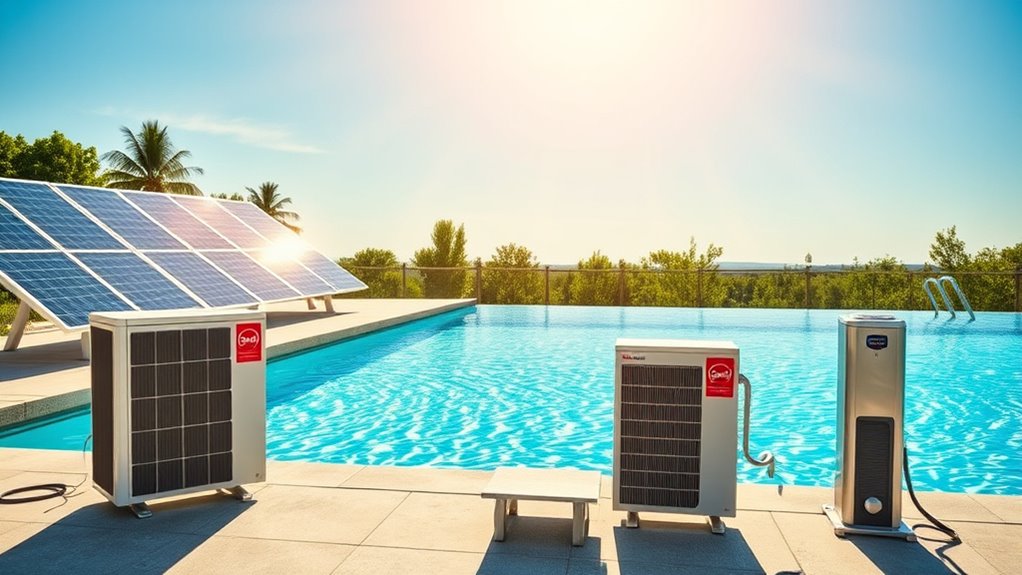
Solar heating systems offer an eco-friendly and cost-effective way to warm your home or water supply. They harness sunlight, reducing reliance on fossil fuels and lowering your energy bills. These systems work best in sunny climates and can be integrated with existing heating setups for efficiency. You can choose between flat-plate collectors or evacuated tube collectors based on your needs and space. By utilizing renewable energy sources, these systems contribute to a sustainable future.
Comparing Energy Consumption of Different Heating Options

When evaluating heating options, understanding their energy consumption helps you make cost-effective and environmentally conscious decisions. Heat pumps typically use less electricity than electric resistance heaters because they transfer heat rather than generate it directly. Gas heaters consume fuel directly, which can be cheaper but releases emissions. Solar systems rely on sunlight, making their energy use dependent on weather and location; they often require backup systems, increasing overall consumption. In terms of efficiency, heat pumps usually offer the best balance of low energy use and performance. Gas heaters might be faster but tend to consume more energy and produce emissions. Solar can be highly efficient in sunny climates but may need supplementary heating, affecting total energy consumption. Comparing these options helps you choose the most sustainable and cost-effective solution for your pool. Innovative solutions emerge amidst challenges in various industries.
Installation and Maintenance Requirements for Each Method
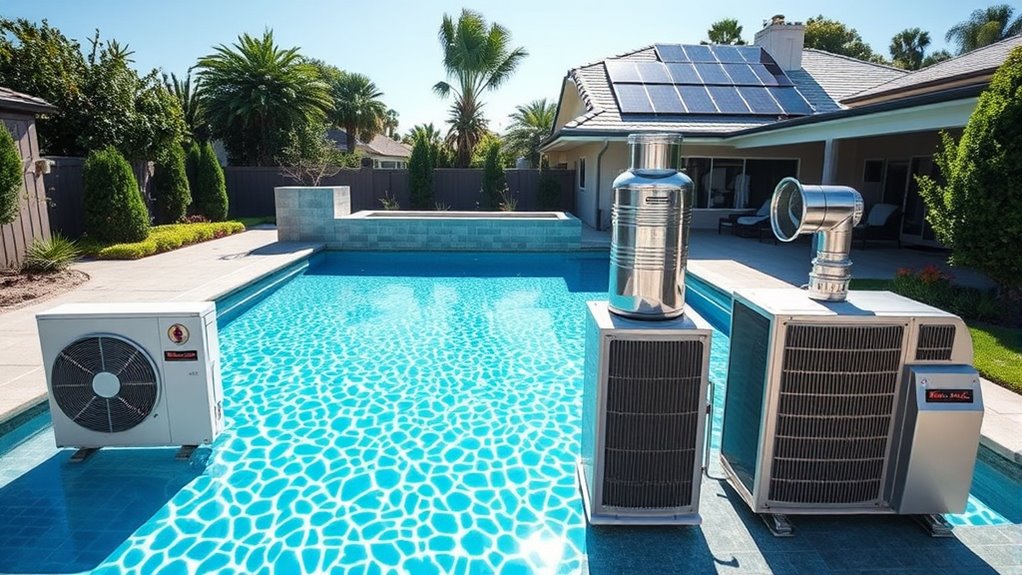
Understanding the installation and maintenance requirements of each heating method is key to ensuring their long-term efficiency and cost savings. Heat pumps require a proper outdoor space and a dedicated electrical connection, with regular cleaning of filters and annual professional inspections to maintain performance. Gas heaters need a secure connection to a gas supply and proper ventilation to prevent dangerous fumes; they also demand periodic inspections and servicing of burners and vents. Solar heating systems involve installing solar collectors on your roof or property, requiring space and proper orientation for maximum sun exposure. Maintenance mainly includes cleaning collectors and checking for leaks or damage. Each system demands specific upkeep to operate efficiently, so plan for routine checks and timely repairs to maximize longevity and performance. Additionally, understanding narcissistic traits can help in recognizing potential issues with family or service providers involved in installation or maintenance, ensuring better communication and trust.
Cost Analysis: Initial Investment Versus Long-Term Savings
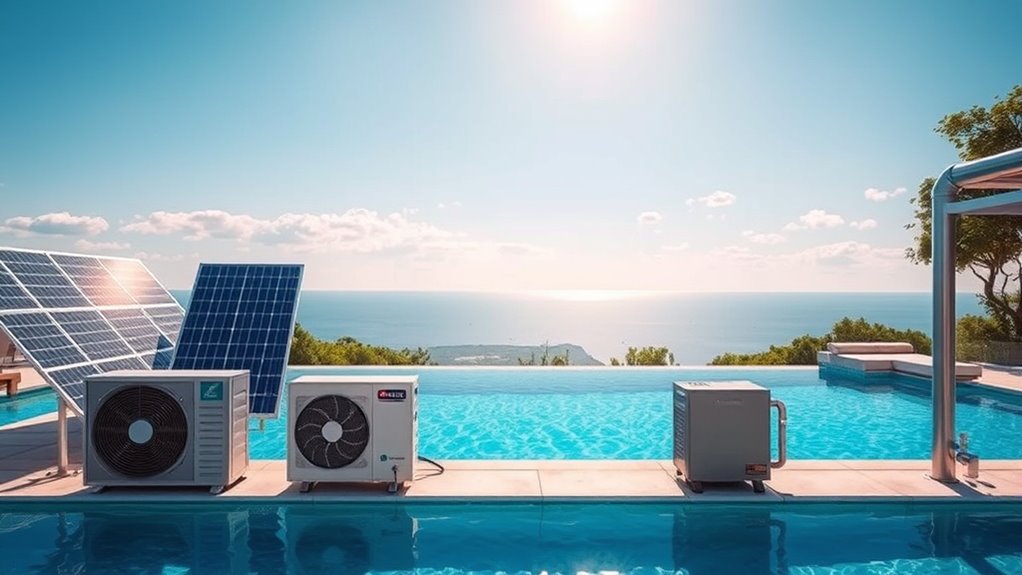
Choosing the right heating system involves weighing the initial costs against potential long-term savings. Heat pumps may have a higher upfront price but offer lower energy bills over time. Gas heaters usually cost less initially but can rack up higher operational expenses. Solar systems often require significant initial investment but can drastically cut energy costs long-term. Consider these factors:
- Upfront installation costs and equipment prices
- Expected energy expenses over 5, 10, or 15 years
- Maintenance and replacement costs
- Potential government incentives or rebates
Environmental Impact and Sustainability of Heating Choices

Environmental impact and sustainability are key factors to contemplate alongside initial costs and long-term savings. Your choice of heating method affects your pool’s carbon footprint and resource consumption. Heat pumps are energy-efficient, drawing minimal electricity and reducing greenhouse gas emissions if powered by renewable sources. Gas heaters, on the other hand, emit carbon dioxide and contribute to air pollution, making them less sustainable. Solar heating offers the most eco-friendly option, harnessing free, renewable sunlight with no emissions. However, it may require a larger initial investment and depend on sunlight availability. By evaluating these factors, you can select a heating method that aligns with your environmental values while maintaining efficient, sustainable pool heating.
Factors to Consider When Choosing the Best Heating Method
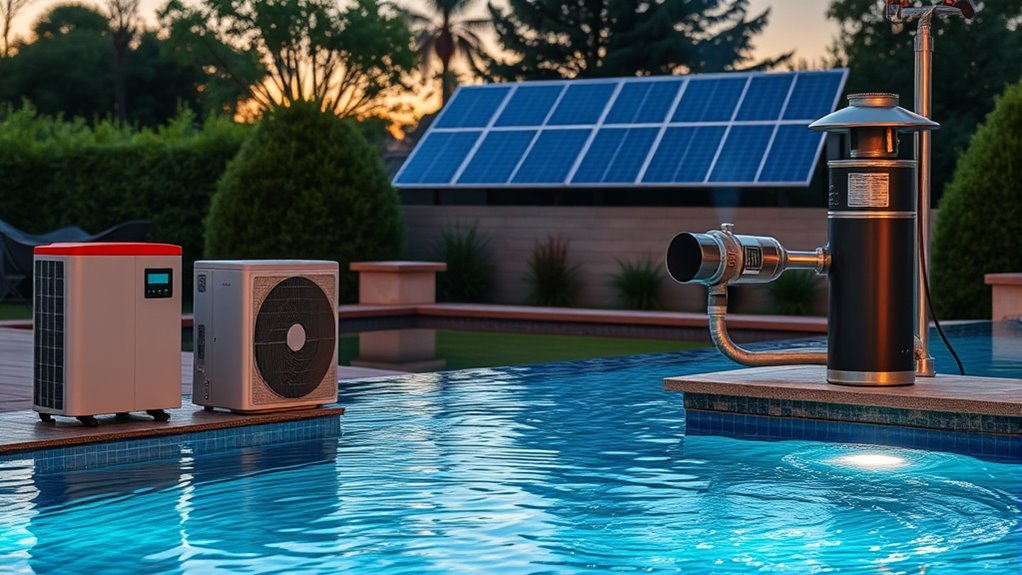
When selecting the best heating method for your pool, you need to weigh several key factors to make an informed decision. First, consider your budget—some options have higher upfront costs but save money long-term. Next, think about energy efficiency; a more efficient system reduces ongoing expenses. Availability of resources is also essential; for example, solar depends on sunlight, while gas requires a supply connection. Finally, evaluate your climate; colder regions may benefit more from heat pumps or gas, while solar works best in sunny areas. To help clarify, think about:
- Upfront installation costs
- Ongoing energy expenses
- Local climate and sunlight exposure
- Resource availability and infrastructure
- The importance of choosing an energy-efficient system can significantly impact your long-term operational costs.
Frequently Asked Questions
How Does Climate Influence the Best Heating Method for an Endless Pool?
Climate plays a big role in choosing your pool’s heating method. In colder areas, heat pumps are efficient because they work well even in lower temperatures. If you experience mild winters, solar heating might be enough and more eco-friendly. In very cold climates, gas heaters provide quick, reliable warmth. You should consider your local weather when selecting a system to keep your pool comfortably heated year-round.
Can Multiple Heating Systems Be Combined for Optimal Efficiency?
Two heads are better than one, and the same applies to combining heating systems. You can mix a heat pump with solar panels or gas heaters to boost efficiency and reliability. This hybrid approach guarantees you’re not solely dependent on one system, saving energy and reducing costs. Just make sure to have a professional design your setup, so all systems work in harmony and meet your pool’s heating needs efficiently.
What Are the Safety Considerations for Each Heating Type?
You should prioritize safety by ensuring proper installation and regular maintenance for each heating system. Gas heaters require good ventilation to prevent carbon monoxide buildup, while heat pumps need secure electrical connections to avoid shocks. Solar heaters involve electrical components that should be weatherproofed. Always follow manufacturer instructions, install safety devices like sensors and alarms, and consult professionals to reduce risks and keep your pool safe for everyone.
How Do Maintenance Costs Compare Over the Lifespan of Each System?
You’ll find that heat pumps typically have the lowest maintenance costs over their lifespan because they have fewer moving parts and don’t require fuel refills. Gas systems tend to cost more long-term due to regular fuel and servicing needs. Solar heating has minimal ongoing costs but may require occasional cleaning and component checks. Overall, heat pumps usually offer the most budget-friendly maintenance, with solar being the least expensive upfront.
Are There Government Incentives for Installing Solar or Energy-Efficient Heaters?
Yes, you can find government incentives for installing solar and energy-efficient heaters. Many local, state,, and federal programs offer rebates, tax credits, or grants to encourage sustainable upgrades. You should check with your local energy authority or visit official government websites to discover available incentives in your area. Taking advantage of these programs can substantially reduce your upfront costs and make eco-friendly options more affordable for your endless pool.
Conclusion
Choosing the right heater for your endless pool isn’t just a decision—it’s the secret weapon for endless summer fun. Whether you go with a heat pump, gas, or solar, each offers unique perks and challenges. Think of it as finding your perfect match in a sea of options. With the right choice, you’ll enjoy warm waters all year without draining your wallet or harming the planet—your pool’s secret to staying forever inviting.



